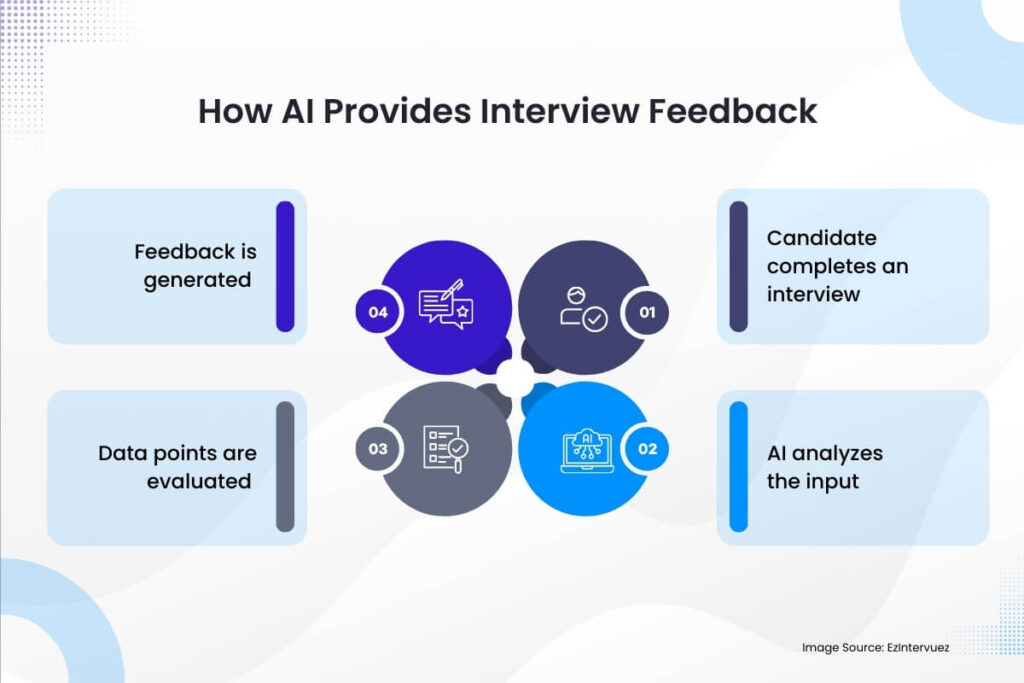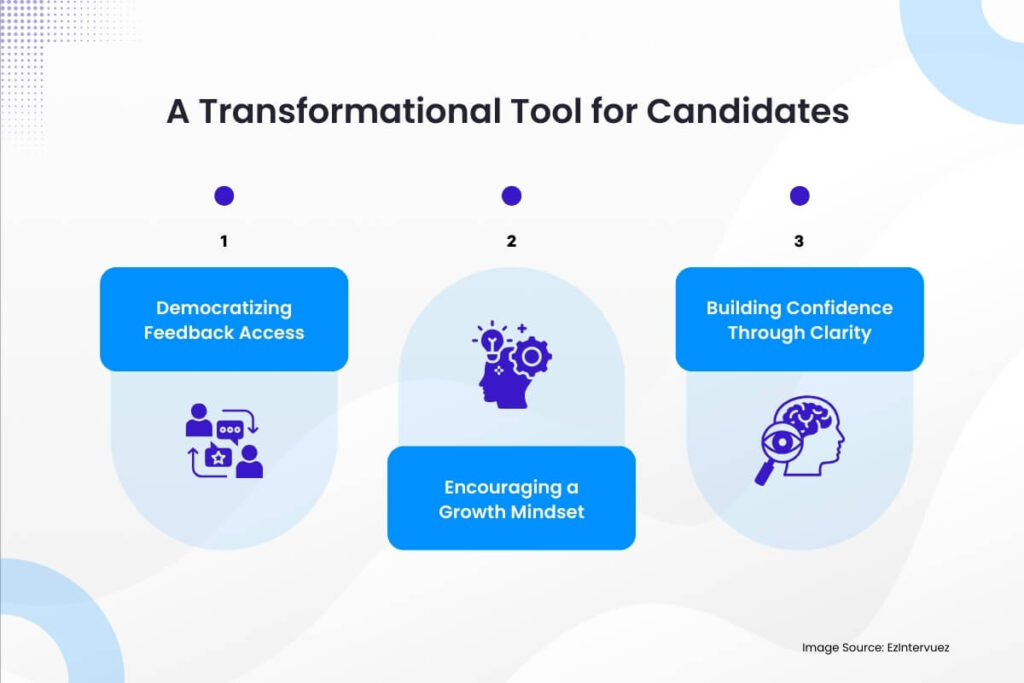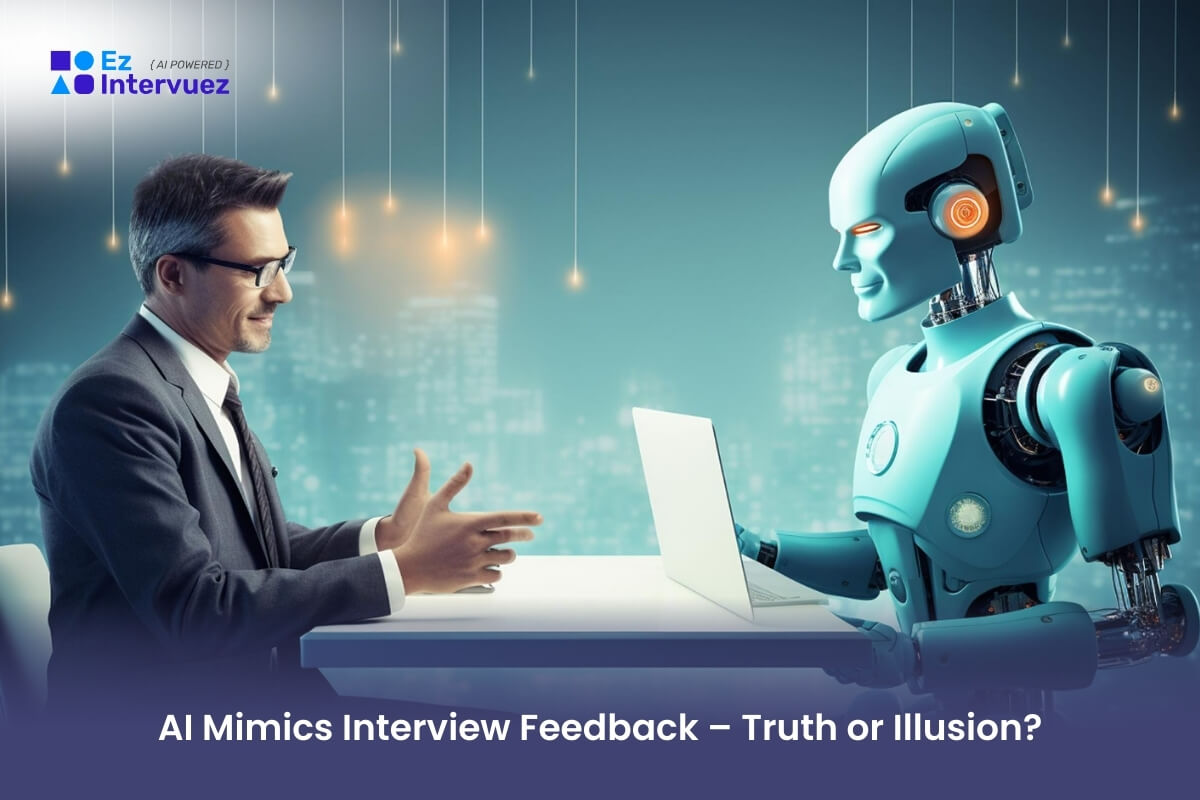The intersection of artificial intelligence and human development is one of the most exciting frontiers in today’s job market. One particularly promising application is the use of AI to provide feedback after job interviews—something that traditionally has been elusive, subjective, and often unavailable.
Now, imagine receiving immediate, structured feedback on your interview performance—what you did well, where you might improve, and how you came across overall. Thanks to AI-powered interview analysis tools, that reality is becoming more common, accessible, and useful.
In this post, we’ll explore how AI is reshaping post-interview feedback, how closely it mimics human judgment, and why this technological shift is not just helpful, but potentially transformative—for candidates and employers alike.
Experience AI feedback firsthand with EzIntervuez
The Evolution of Interview Feedback
Traditionally, post-interview feedback has been a rare commodity. Hiring managers and recruiters are often too busy to offer detailed insights to every candidate. When feedback is given, it can be vague or inconsistent—based on gut feeling or subjective impressions. Many job seekers are left wondering: “Did I do something wrong? Was I close? Should I change my approach?”
Enter AI. Modern tools now use machine learning and natural language processing (NLP) to assess a candidate’s interview responses, body language (in video formats), voice tone, and even choice of words. These tools aim to deliver timely, data-driven, and actionable feedback to help candidates improve and employers maintain consistency and fairness in hiring.
But how good is this AI-generated feedback? And how closely does it resemble the kind of feedback you’d get from a seasoned hiring manager?
How AI Provides Interview Feedback
AI interview platforms like HireVue, Modern Hire, myInterview, and others are built to replicate parts of the human evaluation process. Here’s a general breakdown of how they work:

- Candidate completes an interview – usually a video or written format.
- AI analyzes the input – using algorithms trained on thousands of interview sessions, successful outcomes, and performance indicators.
- Data points are evaluated – including tone, clarity, emotional expression, pace, completeness of answers, and alignment with job criteria.
- Feedback is generated – typically in categories such as communication skills, confidence, engagement, language proficiency, and content relevance.
The result is often a comprehensive, easy-to-understand feedback report that offers candidates valuable insights into how they came across and where they can grow.
Where AI Gets It Right — and Why That Matters
1. Instant and Consistent Feedback
Unlike human interviewers, AI doesn’t take breaks, have off days, or forget details. It provides immediate feedback after the interview, which is invaluable for candidates looking to iterate quickly and apply learnings to their next opportunity.
This speed and consistency are especially empowering for job seekers who don’t typically receive feedback or have access to a coach or mentor.
2. Objective Measurement
AI tools are designed to remove personal bias by assessing measurable behaviors and patterns. For example, it might analyze:
- Whether your answers were concise and on-topic.
- The use of strong, active language.
- Your speaking pace and clarity.
This kind of objective measurement allows for a fairer comparison across all candidates, helping to level the playing field.
3. Constructive Development Insights
The most helpful aspect of AI-generated feedback is how it shifts the conversation from “pass or fail” to continuous improvement. Instead of waiting to hear whether you got the job, you can focus on:
- Improving specific skills like storytelling or structured thinking.
- Enhancing your communication style.
- Becoming more aware of filler words, awkward pauses, or overly complex answers.
In this sense, AI feedback serves not just the hiring process, but personal development and lifelong learning.
Want a deeper look at your performance? Explore our AI interview tips and practice resources.
Realistic Neutrality: Understanding the In-Between
Of course, AI isn’t magic. It has limitations—but even those are opportunities for growth and innovation.
1. It May Lack Context
A human interviewer might know you’re nervous because it’s your dream company, or that you’re a non-native speaker doing your best in a second language. AI can’t always account for that level of context—yet. Still, advances in AI empathy detection and multimodal learning are rapidly closing this gap.
2. It Can Reflect Human Biases in Data
AI tools learn from historical data, which might include biased hiring patterns from the past. Fortunately, many leading platforms now undergo regular audits, fairness testing, and ethical reviews to detect and minimize unintended bias. As more diverse data is used to train these systems, their fairness and inclusivity continue to improve.
3. It’s Best as a Supplement, Not a Replacement
AI is most effective when used alongside human judgment. It’s a powerful tool for surfacing patterns and prompting useful feedback, but it should augment—not replace—human empathy, intuition, and cultural understanding.
A Transformational Tool for Candidates
Let’s focus on what really matters: how AI is helping candidates grow.

1. Democratizing Feedback Access
One of the most powerful and transformative benefits of AI-generated interview feedback is its ability to democratize access to high-quality insights. Historically, only candidates with access to elite professional networks, personal mentors, or expensive career coaches could receive personalized interview feedback. For the majority of job seekers, especially those early in their careers or from underrepresented backgrounds, detailed performance feedback was a luxury they often couldn’t access.
AI changes that.
Now, regardless of your location, background, or resources, any candidate can receive structured, actionable insights into their interview performance. This includes feedback on communication style, content structure, pacing, tone, and more. The result is a significantly more level playing field—where growth is no longer determined by privilege, but by opportunity and effort.
2. Encouraging a Growth Mindset
Perhaps even more impactful is the mindset shift AI feedback inspires. Rather than viewing interviews as high-stakes pass/fail tests, candidates can begin to see them as learning opportunities. The feedback becomes a constructive reflection—like a mirror—not a judgment. It offers a clear view of what went well and where there’s room for improvement, without the ambiguity or emotional weight that often accompanies traditional rejections.
This encourages candidates to embrace a growth mindset—a belief that skills can be developed over time with effort, feedback, and practice. Interviews evolve from something to fear into a meaningful part of professional development.
3. Building Confidence Through Clarity
Confidence grows with clarity. When candidates receive immediate, focused feedback, they gain a better understanding of how they come across—and what’s working. Whether it’s validating strengths like clarity of speech or offering helpful tips to improve storytelling, AI feedback reduces the mystery and anxiety around performance.
Over time, this consistent feedback loop builds real confidence. Candidates walk into interviews better prepared, more self-aware, and with the assurance that they’re continually improving.
In essence, AI isn’t just helping candidates get jobs—it’s helping them grow, improve, and thrive in the process.
Employers Benefit Too
AI-powered feedback tools don’t just benefit candidates—they also enhance the hiring experience for employers.
- Efficiency Gains: Recruiters can spend more time on high-value tasks and less on manual screening.
- Consistency and Fairness: Every candidate is measured against the same rubric.
- Candidate Experience: Companies that provide feedback—especially AI-driven, constructive feedback—stand out as thoughtful, future-focused employers.
This positions the organization as candidate-centric and invested in career development, which is especially appealing to top talent.
Looking Ahead: The Bright Future of AI Feedback
There’s a common misconception that artificial intelligence is here to take over human roles, especially in areas like hiring and recruitment. But the reality is far more optimistic—and far more exciting. AI isn’t replacing people; it’s empowering them. In the world of talent development and recruitment, AI is serving as a strategic ally that enhances human decision-making, strengthens candidate potential, and builds more equitable hiring ecosystems.
For job seekers, AI introduces faster learning loops. Instead of waiting days or weeks for feedback—or never receiving any at all—candidates now receive instant, constructive insights that help them grow. This shift transforms every interview into a learning opportunity, accelerating improvement and building confidence along the way.
For employers, AI supports higher-quality hiring decisions. AI can highlight candidate strengths by analyzing structured data objectively that might be overlooked and reduce inconsistencies in how individuals are evaluated. This leads to more informed, data-backed hiring outcomes—ones that are not just efficient, but aligned with long-term talent success.
Most importantly, AI promotes fairer, more inclusive hiring practices. It evaluates all candidates using the same criteria, helping reduce unconscious biases and creating more equal opportunities—especially for those from underrepresented backgrounds.
And the innovation is just getting started. Advances in emotion AI, explainable AI, and ethical AI are helping these systems become smarter and more human-aware. In the near future, candidates could receive:
- Tips tailored to their learning style, ensuring feedback is personalized and easier to act on.
- Encouragement based on personality traits, building motivation alongside insight.
- Progress tracking over time, so candidates can clearly see how they’ve grown.
In short, AI is enabling a smarter, kinder, and more growth-oriented hiring ecosystem—one where everyone benefits. By combining the best of technology with the best of human potential, we’re not just making hiring more efficient; we’re making it more human-centered, inclusive, and transformative.
Embrace the Feedback Frontier, Get EzIntervuez
So, is AI-generated interview feedback correct, wrong, or in-between?
The most optimistic answer is: it’s improving, fast, and already immensely valuable.
It may not be perfect, but it consistently delivers practical, actionable insights that help candidates grow. It offers something that many job seekers have long been missing: structured, timely, and objective guidance.
When viewed through the lens of learning and growth, AI feedback is not just a tool; it’s a partner in your career journey. Whether you’re preparing for your first interview or your fiftieth, AI feedback from tools like EzIntervuez can be a powerful ally in your toolkit. It is shining a light on your strengths, sharpening your skills, and helping you present your very best self.
Are you ready to make your interviews a learning opportunity, not just a test? Embrace AI feedback, and let it move you forward.
Still have questions about AI interview feedback?
